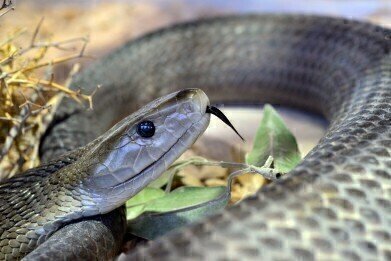News & Views
Collaboration develops Snakebite Antivenoms
Oct 12 2018
Leading scientists from the Technical University of Denmark (DTU) and the Instituto Clodomiro Picado of the University of Costa Rica, have produced a collaborative paper along with Cambridge-based IONTAS, describing their joint efforts on producing experimental snakebite antivenoms. The paper * describes the development of a panel of human antibodies that neutralise elements of black mamba snake toxin in an in vivo model.
Each year, around two million people fall victim to snakebite envenoming, which has recently been introduced on the World Health Organisation’s list of neglected tropical diseases due to its high disease burden.
The “proof of concept” research described in the paper identified key components, including dendrotoxins, in the black mamba’s venom which contribute to venom toxicity. Human antibodies were generated to these dendrotoxins using IONTAS Phage Display Technology and cocktails of IgG-formatted human antibodies were then shown to protect mice from dendrotoxin-mediated neurotoxicity in vivo.
Associate Professor Andreas Hougaard Laustsen, Technical University of Denmark, commented: “Current antivenoms are based on plasma-derived animal antibodies, which are effective in neutralising venom toxicity, but are also associated with serious adverse reactions, such as serum sickness, due to their non-human origin. With our work we have laid the first stone on the technological path towards the manufacture of a next-generation fully human antivenom, devoid of such drawbacks.”
Professor José María Gutiérrez, Instituto Clodomiro Picado, Universidad de Costa Rica, said: “It is rewarding to see that classic techniques in toxinology and state-of-the-art methodologies of recombinant DNA could be successfully combined to demonstrate clear therapeutic potential. This recombinant antibody approach opens the door to the development of novel tools in the treatment of snakebites.”
Dr John McCafferty, Founder and CEO, IONTAS said: “Snake envenomation is a particular burden among the world’s poorest people and the approach to treatment, based on poorly defined animal serum has not changed in decades. IONTAS were motivated to contribute our resources and experience in recombinant antibody technology towards this initial proof-of-concept study. We hope that this report will help encourage funders to support the scientific community and advance the treatment of snakebites using modern antibody engineering methods”
*Published in Nature Communications
Digital Edition
Lab Asia 31.2 April 2024
April 2024
In This Edition Chromatography Articles - Approaches to troubleshooting an SPE method for the analysis of oligonucleotides (pt i) - High-precision liquid flow processes demand full fluidic c...
View all digital editions
Events
Apr 24 2024 Jakarta, Indonesia
Apr 25 2024 Istanbul, Turkey
Apr 28 2024 Montreal, Quebec, Canada
May 05 2024 Seville, Spain
InformEx Zone at CPhl North America
May 07 2024 Pennsylvania, PA, USA


















